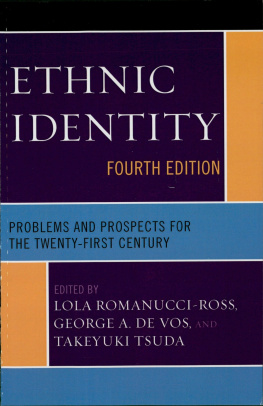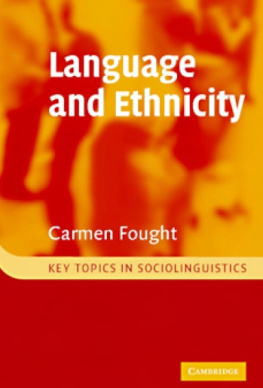Young People, Social Capital and Ethnic Identity
Social capital and ethnicity are crucial to young people's understandings of their social world. The strong bonding networks often assumed in ethnic groups suggest that individuals may prefer to be bonded to each other according to shared socio-cultural factors such as shared histories, memories, language, customs, traditions and values. However, bridging forms of social capital allow new understandings of ethnic identities to emerge, and which involve dynamic and complex social processes that are continually changing and evolving according to time, location and context.
This book explores the ways in which the concepts of social capital and ethnicity play a central role in young people's relationships, participation in wider social networks and the construction of identities. Researchers and scholars working in the fields of children and youth studies, education, families, social and racial and ethnic studies, offer differing accounts of the ways in which social capital operates in young people's lives across diverse social settings and ethnic groups. This edited book is timely and significant given the public interest of researchers, academics, politicians and policymakers working in areas of youth and community work, race relations and cultural diversity.
This book was published as a special issue of Ethnic and Racial Studies.
Tracey Reynolds is a Senior Research Fellow at the Families and Social Capital Research Group, London South Bank University.
Young People, Social Capital and Ethnic Identity
Edited by
Tracey Reynolds
First published 2011
by Routledge
2 Park Square, Milton Park, Abingdon, Oxon, OX14 4RN
Simultaneously published in the USA and Canada
by Routledge
270 Madison Avenue, New York, NY 10016
Routledge is an imprint of the Taylor & Francis Group, an informa business
2011 Taylor & Francis
This book is a reproduction of Ethnic and Racial Studies, vol. 33, issue 5. The Publisher requests to those authors who may be citing this book to state, also, the bibliographical details of the special issue on which the book was based.
Typeset in Times New Roman by Taylor & Francis Books
All rights reserved. No part of this book may be reprinted or reproduced or utilised in any form or by any electronic, mechanical, or other means, now known or hereafter invented, including photocopying and recording, or in any information storage or retrieval system, without permission in writing from the publishers.
British Library Cataloguing in Publication Data
A catalogue record for this book is available from the British Library
ISBN13: 978-0-415-55211-0
Disclaimer
The publisher would like to make readers aware that the chapters in this book are referred to as articles as they had been in the special issue. The publisher accepts responsibility for any inconsistencies that may have arisen in the course of preparing this volume for print.
Contents
| Tracey Reynolds |
| Sheena McGrellis |
| Arniika Kuusisto |
| Tracey Reynolds |
| Elisabetta Zontini |
| Ravinder Barn |
| Daniel Briggs |
| Susie Weller |
Ravinder Barn is Professor in the Department of Health and Social Care at Royal Holloway, University of London.
Daniel Briggs is a Senior Lecturer in Criminology and Criminal Justice at the University of East London.
Arniika Kuusisto is Researcher in the Department of Applied Sciences of Education at the University of Helsinki.
Sheena Mcgrellis is a Senior Research Fellow in the Families and Social Capital Research Group, London South Bank University, but based at University of Ulster, Magee.
Tracey Reynolds is Senior Research Fellow in the Families and Social Capital Research Group, at London South Bank University.
Susie Weller is a Senior Research Fellow in the Families & Social Capital Research Group at London South Bank University.
Elisabetta Zontini is Lecturer in the School of Sociology and Social Policy at Nottingham University.
Tracey Reynolds
Abstract
British empirical analyses investigating the relationship between ethnicity and social capital tend to highlight the views and experiences of adult minority ethnic individuals. In contrast the experiences of young people remain an under developed, but growing, research area. Our interest in this special issue stems from the desire to promote young people's voices in public and policy debates, particularly those from minority ethnic groups and communities, and to bring to the fore their experiences. Drawing on empirical research conducted in the Caribbean, England, Finland, Italy and Northern Ireland, the collection of articles explores the social capital of young people across diverse ethnic and cultural settings. We draw on theories of ethnicity and social capital to explore the ways in which they might be utilised as social resources by young people. We consider how ethnicity and cultural belonging might be regarded as both positive and negative forms of social capital among young people. We also critically reflect on ideas about social capital and ethnicity to assess the extend to which new forms of identities, networks and participation are emerging in the real life contexts of young people belonging to cultural and ethnic minority communities.
In recent times the concepts of ethnicity and social capital have attracted much policy attention both nationally and internationally. Researchers and policy-makers in a variety of different fields have focused on the relationship between ethnicity and social capital to provide generalized explanations of rapid social changes occurring in contemporary western societies, and also to reflect on whether these changes have been for the good or ill (Goulbourne and Solomos 2003). Ethnicity and social capital analyses also address the collective networks that emerge from individuals and groups sharing a common set of values (Cheong et al. 2005). British empirical analyses investigating the relationship between ethnicity and social capital tend to highlight the views and experiences of adult minority ethnic individuals. In contrast, the experiences of young people remain an under-developed research area. Although there have been growing number of studies that examine social capital and ethnicity in relation to young people (see, for example, Dwyer et al. 2006; Parker and Song 2006; Reynolds 2006a, 2000b), this is countered by studies that either marginalize the experiences of young people or contextualize them as objects of study. Indeed, young people across ethnically and culturally diverse groups are typically recognized as passive beneficiaries or recipients of social capital (Morrow 2001; Weiler 2006; Holland, Reynolds and Weiler 2007). A number of writers focusing on children and young people are also critical of the way in which the literature constructs them as competitors for resources rather than individuals generating social capital in their own right (Holloway and Valentine 2000; Gillies and Lucey 2006).
Our interest in this special issue stems from the desire to promote young people's voices in public and policy debates, particularly those from minority ethnic groups and communities, and to bring to the fore their experiences. The collection of articles in this social issue volume emerged out of a one-day conference entitled Young People, Ethnicity and Social Capital, organized as part of the Families and Social Capital Research Group seminar series, and held at London South Bank University in March 2008. Drawing on empirical research conducted in the Caribbean, England, Finland, Italy and Northern Ireland, the collection of articles explores the social capital of young people across diverse ethnic and cultural settings. Crucially, we draw on theories of ethnicity and social capital to explore the ways in which they might be utilized as social resources by young people. Our discussion also considers how ethnicity and cultural belonging might be regarded as both positive and negative forms of social capital among young people. We similarly reflect critically on ideas about social capital and ethnicity to assess the extent to which new forms of identities, networks and participation are emerging in the real-life contexts of young people belonging to cultural and ethnic minority communities. This editorial introduction begins with a brief overview of the main theories of social capital and ethnicity. While the aim of this discussion is not to analyse the extensive literature and debates on these theories, it is important to highlight how they have conceptually guided our analyses.







